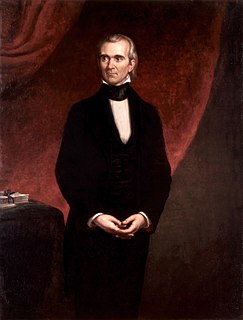 W
WWilliam Henry Harrison was an American military officer and politician who served as the ninth president of the United States in 1841. He died of either typhoid, pneumonia, or paratyphoid fever 31 days into his term, becoming the first president to die in office and the shortest-serving U.S. president in history. His death sparked a brief constitutional crisis regarding succession to the presidency, because the Constitution was unclear as to whether Vice President John Tyler should assume the office of president or merely execute the duties of the vacant office. Tyler claimed a constitutional mandate to become the new president and took the presidential oath of office, setting an important precedent for an orderly transfer of the presidency and its full powers when the previous president fails to complete the elected term.
 W
WThe Curse of Tippecanoe is the supposed pattern of deaths in office of presidents of the United States elected in years that are evenly divisible by 20, from 1840 to 1960. Because of the timing of presidential elections, these are also those taking place in years ending with 0. The presidents fitting this description were William Henry Harrison, Abraham Lincoln (1860), James A. Garfield (1880), William McKinley (1900), Warren G. Harding (1920), Franklin D. Roosevelt (1940) and John F. Kennedy (1960).
 W
WThe history of U.S. foreign policy from 1829 to 1861 concerns the foreign policy of the United States during the presidential administrations of Andrew Jackson, Martin Van Buren, William Henry Harrison, John Tyler, James K. Polk, Zachary Taylor, Millard Fillmore, Franklin Pierce, and James Buchanan. During this era, the United States annexed the Republic of Texas, acquired the Mexican Cession by defeating Mexico in the Mexican–American War and partitioned Oregon Country with United Kingdom of Great Britain and Ireland. The period began with the inauguration of Jackson in 1829, while the onset of the American Civil War in 1861 marked the start of the next period in U.S. foreign policy.
 W
WThe inauguration of William Henry Harrison as the ninth President of the United States was held on Thursday, March 4, 1841, at the East Portico of the United States Capitol in Washington, D.C. This was the 14th inauguration and marked the commencement of the only four-year term of both William Henry Harrison as President and John Tyler as Vice President. The presidential oath of office was administered to Harrison by Chief Justice Roger B. Taney. Harrison died 31 days into his term, the first U.S. president to die in office and has the shortest presidential term in American history. Tyler then succeeded to the presidency, creating precedence which would be followed seven more times before it was officially regulated through the Twenty-fifth Amendment in 1967.
 W
WCharles Bingham Penrose was a Pennsylvania attorney and politician. He served as Speaker of the Pennsylvania Senate and Solicitor of the United States Treasury.
 W
WIn 1840, William Henry Harrison was elected President of the United States. Harrison, who had served as a general and as United States Senator from Ohio, defeated the incumbent president, Democrat Martin Van Buren, in a campaign that broke new ground in American politics. Among other firsts, Harrison's victory was the first time the Whig Party won a presidential election. A month after taking office, Harrison died and his running mate John Tyler served the remainder of his term, but broke from the Whig agenda, and was expelled from the party.
 W
WThe 1840 United States presidential election was the 14th presidential election, held from Friday, October 30 to Wednesday, December 2, 1840. Economic recovery from the Panic of 1837 was incomplete, and Whig nominee William Henry Harrison defeated incumbent President Martin Van Buren of the Democratic Party. The election marked the first of two Whig victories in presidential elections.